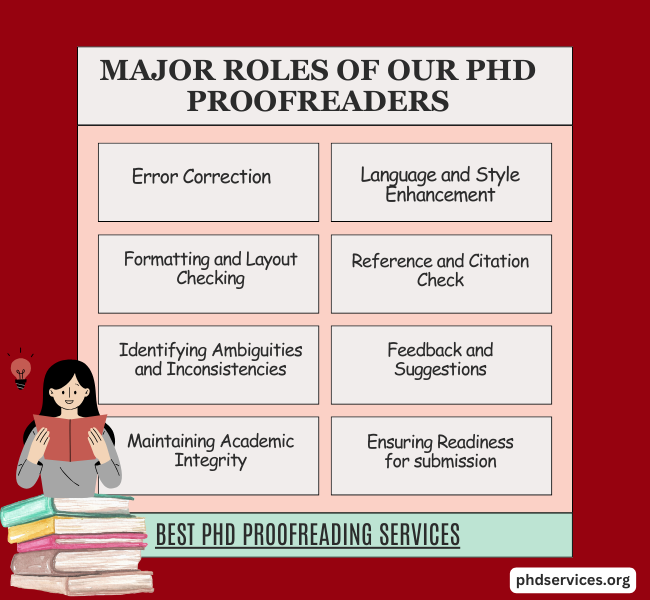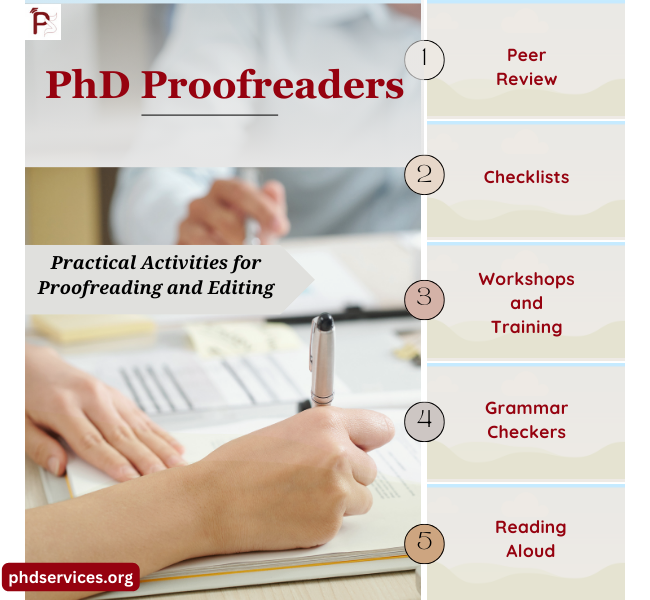PhD proofreaders hold a pivotal position in the final phase of thesis preparation. Their primary objective is to ensure that the document is devoid of errors and presented in a meticulous, cohesive, and institutionally significant manner. Allow our esteemed PhD proofreaders to refine your paper using cutting-edge tools for thorough revision, editing, and impeccable spelling. The caliber of our work will become evident to you when you collaborate with us, as we adhere to your university’s standards and guarantee academic excellence through our exceptional service.
The following are some of the major roles and tasks of our PhD proofreaders:
- Error Correction
- Grammatical Accuracy: Proofreaders examine the text for grammatical mistakes, such as subject-verb agreement, tense uniformity and right utilization of pronouns.
- Punctuation and Spelling: We validate for valid punctuation utilization and spelling mistakes that are frequently lost by spell-checkers.
- Language and Style Enhancement
- Clarity and Readability: In our work, we confirm that the writing is precise, brief and easily extensible, recommending revisions for fully complicated or convoluted sentences.
- Consistency in Style: Our proofreaders keep constant in writing style and tone that is particularly essential in lengthy documents such as PhD thesis.
- Formatting and Layout Checking
- Adherence to Guidelines: We make sure that the thesis follows the particular structuring directions offered by the university or educational institution, such as margins, font size, and heading styles.
- Consistency in Formatting: Consistency in formatting verifies the uniformity in the layout, like headings, paragraph alignment, spacing and the utilization of bullet points or numbering.
- Reference and Citation Check
- Correct Formatting: According to the appropriate educational style direction (e.g., APA, MLA, Chicago), we check that citations and references are rightly structured.
- Consistency: Our work is to make sure the uniformity in the mentioned references within the content and demonstrated in the bibliography or reference list.
- Identifying Ambiguities and Inconsistencies
- Content Consistency: We validate for dissimilarity or un-uniformity in the content, including unmatched data in the text and tables or nonuniform arguments.
- Clarity in Argumentation: Confirm that the thesis offers a consistent and reasonably formatted argument all through.
- Feedback and Suggestions
- Constructive Feedback: Our work offers feedback on regions which may need clarity or future construction.
- Suggestions for Improvement: For enhancing the complete standard of the thesis, we provide suggestions.
- Maintaining Academic Integrity
- Upholding Standards: Make sure that the thesis achieves the increased standards expected of institutional writings.
- Ethical Considerations: It is important to know that the best proofreader must obey the author’s guidelines and thoughts and we confirm that the modification does not change the significance of the text.
- Ensuring Readiness for submission
- Final Review: To confirm whether the thesis is prepared for submission, carry out a final review to check the important information that has failed to notice before.

Proofreading and editing activities for writing
Proofreading and editing are important elements of the writing process, especially in institutional and research contents. They essentially improve the clearness, uniformity and whole standard of the written work. Here we give solutions to how proofreading and editing activities assist in research writing:
- Improving Clarity and Readability
- Editing for Clarity: Reduces complicated sentences, removes unnecessary words and rephrases difficult statements to create the text more interpretable.
- Enhancing Readability: To enhance the flow and readability of the document, adapt sentence format and paragraph flow.
- Ensuring Accuracy and Consistency
- Correcting Grammatical Errors: Correct mistakes in grammar, punctuations and spelling which may detract from the document’s acceptability.
- Maintaining Consistency: Verify for uniform utilization of terms, definitions and writing style during the document, which is essential for keeping an expert and consistent narrative.
- Refining Academic Tone and Style
- Adhering to Academic Standards: Confirm the writing style achieves the particular institutional quality needed for research documents, containing impartiality and protocols.
- Formatting and Style Guides: Suit the document with particular formatting and reference style directions (APA, MLA, Chicago, etc.), that is important for institutional writing.
- Enhancing Structure and Argument
- Improving Structure: Examine the whole structure of the document to make sure that it reasonably flows from the introduction to final statement.
- Strengthening Argument: Strengthening arguments assists to find regions where the argument or conversion will be weak or unclear, recommending improvements or supplement helping details.
- Eliminating Redundancy and Irrelevance
- Removing Redundancies: Remove redundant or unwanted details which will divert readers from the important points.
- Focusing on Relevance: Confirm that all parts of the documents are appropriate and dedicate directly to the research aim or assumption.
- References and Citation Check
- Ensuring Accurate Citations: Check that all materials are rightly mentioned and referenced, that is important for institutional credibility.
- Quality Assurance: Make sure consistency in the reference list or bibliography, following the needed citation method.
- Finalizing the Document for Submission
- Preparing for Publication: In the framework of the study, the editing progresses to make the document for publication or submission to institutional journals, meetings or as a thesis/ dissertation.
- Quality Assurance: To confirm the document is of increased standard and errorless before submission, it is important to verify the last glance.
Practical Activities for Proofreading and Editing
- Peer Review: Discuss your work with teammates for review. New vision will detect mistakes and provide important understandings.
- Checklists: To systematically face your document, generate or utilize previous editing and proofreading verifications.
- Reading Aloud: Read your work soundly to find out mistakes and examine the flow of your writing.
- Workshops and Training: Take part in writing seminars or training meetings to enhance your editing and proofreading knowledge.
Tools and Resources
- Grammar Checkers: To find grammatical mistakes and recommend enhancements, equipment like Grammarly or ProWritingAid will assist.
- Style Guides: For particular structuring and citation protocols, refer to institutional style directions.

PhD Paper & Thesis Proofreading Services
Our team of exceptionally skilled writers and meticulous proofreaders possess an unparalleled level of expertise, ensuring that your paper is crafted flawlessly and with utmost precision. Our subject matter experts will not only provide you with an exceptional PhD paper, but also share groundbreaking research ideas. Through multiple rounds of editing and formatting, we pave the path to your triumph. We have flawlessly executed PhD Paper & Thesis Proofreading Services for the topics listed below. Waste no time, reach out to our team and reap the rewards of our unparalleled assistance.
- An Entrepreneurial Definition of the Blockchain Technology and a Stacked Layer Model of the ICO Marketplace Using the Text Mining Approach
- SAUSA: Securing Access, Usage, and Storage of 3D Point CloudData by a Blockchain-Based Authentication Network
- Vehicle to Everything (V2X) and Edge Computing: A Secure Lifecycle for UAV-Assisted Vehicle Network and Offloading with Blockchain
- A Survey of DDOS Attack Detection Techniques for IoT Systems Using BlockChain Technology
- BChainGuard: A New Framework for Cyberthreats Detection in Blockchain Using Machine Learning
- IPChain: Blockchain-Based Security Protocol for IoT Address Management Servers in Smart Homes
- Adoption of Blockchain Technology Facilitates a Competitive Edge for Logistic Service Providers
- SimBlock Simulator Enhancement with Difficulty Level Algorithm Based on Proof-of-Work Consensus for Lightweight Blockchain
- A Secure Interoperability Management Scheme for Cross-Blockchain Transactions
- Blockchain Technology: Benefits, Challenges, Applications, and Integration of Blockchain Technology with Cloud Computing
- Blockchain-Based Secure Authentication with Improved Performance for Fog Computing
- Knowledge Mapping Visualization Analysis of Research on Blockchain in Management and Economics
- G-DaM: A Distributed Data Storage with Blockchain Framework for Management of Groundwater Quality Data
- Proposed Model for Secured Data Storage in Decentralized Cloud by Blockchain Ethereum
- Efficient and Secure WiFi Signal Booster via Unmanned Aerial Vehicles WiFi Repeater Based on Intelligence Based Localization Swarm and Blockchain
- Energy Internet Opportunities in Distributed Peer-to-Peer Energy Trading Reveal by Blockchain for Future Smart Grid 2.0
- A Blockchain and Fingerprinting Traceability Method for Digital Product Lifecycle Management
- Fundamental Studies of Smart Distributed Energy Resources along with Energy Blockchain
- IoT-Chain and Monitoring-Chain Using Multilevel Blockchain for IoT Security
- The Systems Approach and Design Path of Electronic Bidding Systems Based on Blockchain Technology